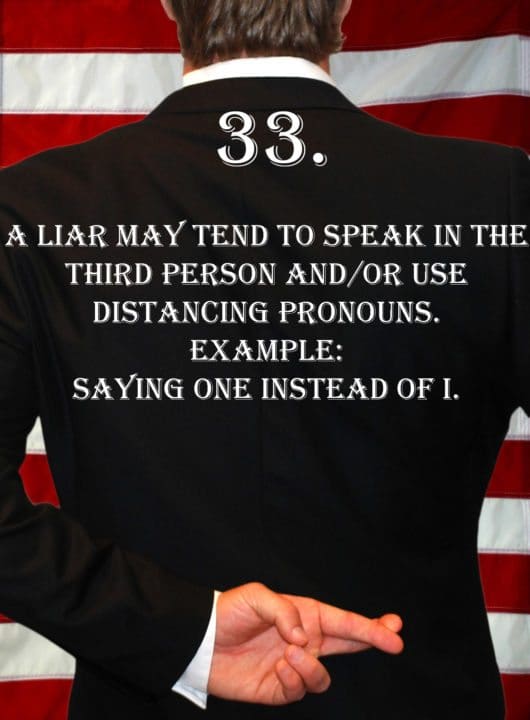
Deception Tip 31:
Liars like to use unconventional, and in ordinary, language in an effort to sound more truthful and sophisticated.
Listen To The Podcast!
E31 – Unconventional Language – Deception Tips Podcast – Click Here To Subscribe
Podcast Transcript
Hello and welcome to the deception tips podcast where you will learn amazing cues to detect deceit that will help you read people like never before. I’m your host Spencer Coffman, let’s get started.
Welcome to episode 31 of the deception tips podcast. Thank you so much for continuing to listen to this podcast. I really hope that you will take the time to leave a review on iTunes or wherever else you’re listening.
It really would help me out, help me to know who’s listening and what’s going on and what you guys like about the podcast. In addition, please connect with me on social media. You can do that on spencercoffman.com.
I also have a brand-new website called deceptiontips.com. It’s been around for a couple of months now, where I’m starting to post all of these podcast episodes and all of my deception tips videos, which I really hope that you will check out on YouTube. I also have the deception tips blogs, different books, and all the stuff that I briefly tell you guys about at the end of every podcast episode.
I really encourage you to dive into that material and check it out. I created it for you guys and a lot of it is free, so you really have no excuse. It’s some good information that is really worth your time and effort because it will help you learn how to read people and detect deception a lot more.
Now, last time we talked about a behavior that is something that a lot of people demonstrate almost in tension or anxiety, it’s a form of relief. It’s something that you often see people doing when they’re sitting in chairs or sitting waiting.
I always know that whenever I’m sitting next to someone that is bouncing their legs like that, sometimes I’ll even put my hand out there and stop it because I can feel my chair vibrating as well with their leg movements and it’s like a crazy deal. So, that’s what we talked about, bouncing both legs.
Now, this is usually done when someone needs to release their tension or anxiety. As we’ve talked about many times before, tension and anxiety build up when people are being deceptive.
When someone tells a lie, there is an immense amount of tension and pressure and stress for them not only to get that lie out because it’s boiling up inside of them and they can’t wait to release it but then, once they release it, now they’re also worried about how the target received the lie. Whether or not they will believe it, whether they messed up when they were speaking it, all of these things go into the tension of telling a lie.
When you’re already nervous about something and then you’re lying about it, you’re even more nervous. And then, when you’re wondering if someone is going to believe you, it’s even more nervous, so a lot of times tension can be released by bouncing the legs, they can be non-rhythmic.
In addition, this is also sometimes a pleasing gesture for some people, so it may mean nothing it is essential that you look for patterns and clusters of behavior. You must always look for patterns and clusters of behaviors so that you will be able to tell whether or not someone is lying or whether or not they are telling the truth.
Now, today we have a special deception tip that is more related to vocal and voice, it is speech patterns and how people talk. It is their word choice and word usage that you want to be on the lookout for.
If people are speaking in a certain manner or a certain way, generally, if you know them or if you talk to them a little bit you kind of have a baseline of what their normal speech sounds like. Sometimes when people lie, they speak in different ways or they have different words they use because they think that it’ll help them tell their lie.
It’s almost like when people write a letter or when they speak in person, the language is usually different. Similarly, when people text or when they talk, the language is also different because they’re trying to communicate in a different form or a different fashion.
Now, by the language is different I don’t mean that’s like French or German or Spanish or English, I’m talking within the language they speak, so within the English language, the way that they speak is different.
It’s either a form of proper grammar or it’s that letters and text like PPL and TY and those kinds of abbreviated mannerisms that people use when they’re texting or when they are writing a formal letter. However, in this instance, it’s not speaking in those abbreviations or anything like that, it is a more sophisticated language or unconventional language.
So, here it is, this is deception tip number 31, liars like to use unconventional and in-ordinary language in an effort to sound more truthful and sophisticated. Here it is again, liars like to use unconventional and in-ordinary language in an effort to sound more truthful and sophisticated.
So, what this means is that a lot of times when people lie, they know that if they use language that sounds better or higher than they normally speak, then they think that some people will believe them.
It’s almost like when we talked about a few times ago, actually it’s more than a few times ago, it was way back in episode 17 when we talked about detailed stories.
How liars like to use a lot of detail in their stories because it makes them seem like they sound more truthful or like they know what they’re talking about. In the same way, a lot of liars like to use more sophisticated or unconventional language so that they sound a little bit more intelligent like they know what they’re talking about.
Now typically, this relates to another episode, episode 15 where we talked about rehearsed stories, is when liars use this unconventional and sophisticated language, they’ve oftentimes rehearsed it.
They’ve planned to use these detailed words or these larger words or oftentimes three-syllable words, things like that, to sound a little bit more educated and a little bit more sophisticated. Now, we’re going to talk a lot more about why they do this and what the reasoning behind it is, coming up right after this.
Not only can you listen to these deception tips, but you can also watch a quick video explaining each one. Subscribe to the body language YouTube channel today.
People always like to sound a little bit more intelligent than they are and that’s why they may use this sophisticated or unconventional language, they want to sound like they know what they’re talking about. In most cases, when people sound like they know what they’re talking about then they sound more believable, more people will believe them if they are more confident and if they sound like they know what they’re saying.
Now, this is something that you’ll obviously want to watch out for because the tough part will be knowing whether or not this person actually knows what they’re talking about. They have these statistics and this unconventional language and things like that as a natural part of their speech or if they’ve just rehearsed it enough times that now they are confident in what they’re saying. They’ve rehearsed the story over and over again, they’ve learned a little bit of the material enough to get by and now they are simply playing you.
Now, this only happens when obviously someone is trying to push information or push an opinion on someone else or it happens a lot of times in sales. Now, you’ll see this a lot when people are trying to sell middle-of-the-road items.
It’s not people selling the ten-dollar items at the store or it’s not people selling the hundred-thousand-dollar-deals or the big equipment or machinery or big printer things or stuff like that, it’s not the contract sales, the big sales, it’s the middle of the road sales.
Typically, this falls in line with car salesman because they’re about the middle of the road, anywhere from 10,000 to 40,000, things like that, it’s an average sale, it’s something everyone needs.
So usually, because there’s so much competition between car salesmen and so many of them out there, sometimes you’ll find that weasel or that snake that they use this unconventional language tactic. They start talking about more details, they start bringing out some more dates or some results or citing, some studies about the safety ratings or about this.
You may mention, you know what, I would really like to get a nice kind of a midsize SUV type, something that still has a good pickup and is a little bit sporty but also that I could throw a car seat in there for the kids.
And they might say, oh, then this is what you want, 0 to 60 in XYZ seconds, and in 1982 they did these studies, 82 might be too long ago but maybe it’s a previous model and in continuation. But they may say, oh yeah, in 2008 it was rated XYZ for this performance, in 2010 it received this award for a safety rating and is rated the best vehicle by Consumer Reports to have three car seats in the back.
They may come up with all this stuff, all these details and these dates or names, stuff that normal people aren’t really going to remember and stuff that’s going to cause you to be like, whoa, dude, where is all this information coming from?
Like way too much information, but they’re using unconventional language to sound a little bit more sophisticated and a little bit more intelligent. It’s something that they are trying to push their opinion and their belief on you. They want you to buy the car so they’re pushing that car on you.
Now typically, this will happen a lot with history, and these history buff type people start to bring out more names, dates, and big-time facts like that to help argue their point or support their point.
They may say, oh yeah, in 18 whatever and 19 whatever this happened, or this happened and then did you know that this guy was a part of this and it was actually related to this and it connected this way? And you’re like, man, I’m never going to remember all this, I don’t care about all this detail just give me the synopsis, the SparkNotes.
Information that normal people don’t remember, it’s information that is only for sophistication. Again, the question is whether or not that person is memorized a few names and dates to help push their story or whether or not they really are a history buff.
That is something that you’ll learn through conversation with them and through watching their normal behaviors and their other behaviors to pick up patterns and clusters of behavior to determine whether or not they are telling the truth.
Now, another time this could happen is when you are talking with people and you may notice that the words that they’re speaking are larger-than-normal. They are more syllables, they are like a five-syllable or sometimes maybe four or even three-syllable words, they’re longer words that are not normal in our everyday language.
I mean, if you take a listen to this podcast again or you get the transcript for it on https://spencercoffman.com/deception-tip-31/ or you check it out anywhere else, you notice that if you read through all these words, a lot of them are single-syllable words or double syllable words. They’re not long like that Mary Poppins Supercalifragilisticexpialidocious 15 or whatever syllable word, no.
Unconventional, that’s probably the longest word in this podcast and it is, it’s unconventional, most of the time people speak at a normal level. Now, the normal level of speech is usually about a fifth grade, it’s sad, it’s really sad, a fifth-grade level. Now, that’s why there’s that big, popular show, Are You Smarter Than a 5th Grader, because most people think, reason, and speak at a fifth-grade reading level.
So, if we read and everything is written at a fifth-grade level, then we speak at a fifth-grade level using those like five to ten cent words. Now, some even say that things have been dumbed down a little bit more so now we’re at more of a third-grade reading level, but keep in mind that that is not the entire population, that is just the masses of people.
So, there will be those out there who think and reason at a college level or even like an eighth-grade level or something like that, they’re always going to be exceptions to every rule.
This is why, again, I cannot say this enough, guys, it is essential to look for patterns and clusters of behavior because if you watch the patterns and clusters of behavior then you will be able to confirm each and every suspicion with more data.
Also, keep in mind that when you learn someone’s baseline behavior, then you have something to go on, you can compare it to that. So, by speaking with someone a little bit more, you’ll learn how they normally talk and normally operate in a normal environment.
I use the word normal a lot there but that basically means like where everything is kind of controlled, contained, they’re feeling a little bit less stress, is more casual, where they’re able to open up and be themselves a little bit more.
Then you hit them with the question of whether or not they lied or getting them to tell the truth and now you’ve added a new can of worms about whether or not they are going, to tell the truth. You’ve added some stress and some tension, you’ve given them a little anxiety.
Now, you can see how they are going to react to that added tension and whether or not they will tell the truth. You’ll find that out based on comparing their behaviors under stress and tension with their current baseline behaviors and see whether or not you pick up any additional signs of deception in that pattern or cluster of behaviors.
So, remember, when people use more sophisticated language, they may be using it deceptively to sound more intelligent and more sophisticated.
So, I want to thank you for listening to the deception tips podcast. I ask that you share with your friends, subscribe to the feed, check out the videos on YouTube, the blog, and also the books I have available, and tune in next week for a new deception tip.
Video Transcript
Hey guys, my name is Spencer Coffman, thank you so much for watching these videos. They’re all about teaching you how to read people and detect deception so that you will be able to tell if someone is lying to you.
Today we have something that you may or may not have heard about before, it is a way that people communicate with each other. It is a form of language that they use when they are trying to sound better or more elevated than they are. It’s almost as if they’re trying to sound a little bit more intelligent, a little bit more believable and people use this all of the time.
Oftentimes, they rehearse it ahead of time so that it doesn’t even sound like it’s out of place or unnatural, so it sounds really natural. The tough part for you is determining whether or not this person really knows what they’re talking about or whether they have just rehearsed enough to sound like they know what they’re talking about.
So, that’s what we’re going to talk about today, here it is, deception tip number 31. Liars like to use unconventional and in ordinary language in an effort to sound more truthful and sophisticated. So, this happens all the time, usually when someone is trying to push their opinions on someone else or push their ideals on someone else. A lot of times it could happen with sales or when someone is trying to sell something.
You may see this with car salesmen a lot where they would all of a sudden start telling you a lot of statistics or they have all these reports, or these scientific studies have been done. Not just saying, oh, here are some statistics, here are some scientific studies, here is what the results say. They might say, in 1972 this happened and then they came out with this and in 1994 another study was done with X Y Z number of participants and then they found these results and it was significant at this level.
You’re like, whoa, this is like a ton of information but they’re using all of these dates and all of these statistics to sound more credible. A lot of times people do it when they’re talking about history. When people start pulling out dates and names and things that normal people don’t remember, then they’re either a history buff and they’re really good with names and dates which is a rare select percent of the population or they are using those things to sound more credible to try to be more believable.
This language is oftentimes elevated language, it’s confusing, it’s more sophisticated, it’s something that in normal everyday conversation people do not talk that way. People don’t use like five syllable words or even four or three syllable words most of the time. Oftentimes, the normal English communication, unfortunately, it’s about at a 5th-grade level and that’s what the reading level is, that’s what communication is.
In addition, most of the time people use, you hear this all the time stick to the 5 or 10 sent words, just easy to understand. If you play back the transcript of this, most of the words that I am using are less than 3 syllables with the exception of that word, that’s 3 syllables. So, most of the time, people use easy words because we want to communicate effectively and efficiently.
When people are trying to sound more sophisticated or more educated than they really are and they’re trying to push an idea on someone else, they may start to elevate that. They may use bigger words, they may also try to use a lot more dates, statistics and cite all kinds of resources to appear more believable. That is something that you should watch for when looking for deception.
If this is your first time watching these videos, I’d love to have you subscribe to the channel on YouTube. Feel free to leave any comments there, if you have any questions or anything at all as well and we’ll get back to you with those. Also, if you’d like some more information, we’ve got books, blog posts, podcasts, all available on spencercoffman.com that are dedicated to teaching you exactly what everybody is really saying.
Until next time.






